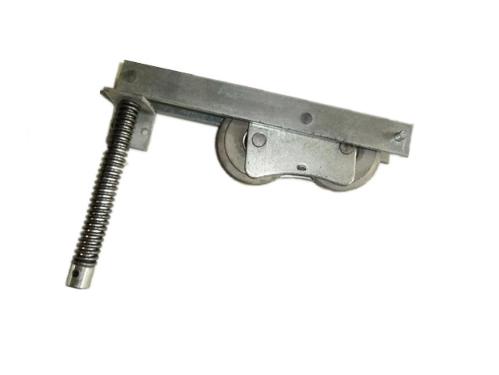When your team is working tens or even hundreds of meters above the ground, the safety of the suspended platform is non-negotiable. Among all the safety components, the rope presser—often referred to as a fall arrester or rope grab—is the final and most critical line of defense. It remains quietly attached to the lifeline, and the moment a fall occurs, it must react within milliseconds to lock the rope and save lives.
- If your suspended platform uses synthetic ropes, choose a certified mobile fall arrester (such as the Petzl ASAP series).
- If your platform uses steel wire ropes, select a wire-rope grab designed specifically for steel safety lines (such as 3M DBI-SALA or Tractel Stopfor).
Before purchasing, always confirm that the device matches your rope type, rope diameter, and applicable standards—size and compatibility are true safety factors.
What is a rope presser, and why does it matter?
A rope presser (also known as a rope grab, mobile fall arrester, or fall arrester) is a device that normally slides freely along a lifeline but instantly locks in the event of a sudden pull or fall, preventing the platform or worker from falling—similar to how a seatbelt locks during sudden braking. Small but life-saving, the right device on a suspended platform can prevent catastrophic falls while minimizing interference with work.
What Are the Best Rope Presser Options for Suspended Platforms?
Different platforms use different types of lifelines—steel wire ropes, synthetic fiber ropes, and sometimes permanent safety cables.
| Type | Rope Type / Diameter | Main Features | Limitations | Best Use / Environment |
| Wire-rope grab | Steel wire rope (8–12 mm) | Rugged, reliable, industrial-grade | Heavy, less smooth motion | BMU, outdoor, permanent systems |
| Mobile fall arrester | Synthetic rope (10–13 mm) | Smooth travel, lightweight, instant lock | Only fits approved rope types | Rope access, temporary platforms |
| Automatic clamping / integrated pressers | Steel or hybrid systems | Auto-adjusting, constant tension | Expensive, brand-specific | High-end or continuous-use platforms |
| Universal units | Steel or synthetic (8–12 mm) | Affordable, easy to source | Certification may vary | Regional or budget-friendly sites |
Wire-Rope Grabs — The Classic Choice for Cable Systems
Most suspended platforms and Building Maintenance Units (BMUs) rely on steel wire ropes as the main suspension and lifeline.
For these, you need dedicated wire-rope grabs, usually made from galvanized or stainless steel.
| Main Features | Designed for rigid steel cables (typically 8–12 mm).Extremely durable and corrosion-resistant—ideal for long-term or outdoor use.Simple, reliable mechanical locking, even in dusty or oily environments.Low maintenance, proven in industrial applications. |
| Limitations | Heavier than rope-based models.Movement may be less smooth during continuous vertical travel.Must match rope diameter exactly—minor deviations can cause slippage or excessive grip. |
| Best For | Building Maintenance Units (BMU)Permanent façade-access systemsOutdoor or industrial environments using steel cables |
Examples: 3M DBI-SALA Lad-Saf, Tractel Stopfor, Gripps Cable Grab
Mobile Fall Arresters — For Synthetic Ropes and Rope Access
If your platform uses synthetic safety ropes (e.g., Kevlar or polyester) or involves frequent up-and-down movement, a mobile fall arrester is ideal. These devices are lighter, smoother, and designed to move automatically along the rope.
| Main Features | Suitable for flexible ropes (Ø 10–13 mm).Slides freely, locks instantly under sudden load.Compact and lightweight—great for portable or temporary platforms.Often includes an integrated energy absorber to reduce impact during a fall. |
| Limitations | Must use manufacturer-approved rope types and diameters—mixing brands may void certification.Not for use with steel cables or permanent vertical lines.Requires regular cleaning if exposed to dust or paint residues. |
| Best For | Rope access techniciansTemporary suspended cradles or light façade cleaningEnvironments requiring mobility and speed |
Examples: Petzl ASAP / ASAP LOCK, ISC RED, Skylotec ACX
Automatic Rope Pressers (Self-Tailing or Auto-Clamping)
Some advanced platforms integrate automatic rope-pressing systems directly into the hoist or safety mechanism. These systems automatically adjust pressure or tension on the rope to ensure smooth operation and even wear.
| Main Features | Designed for rigid steel cables (typically 8–12 mm).Extremely durable and corrosion-resistant—ideal for long-term or outdoor use.Simple, reliable mechanical locking, even in dusty or oily environments.Low maintenance, proven in industrial applications. |
| Limitations | Heavier than rope-based models.Movement may be less smooth during continuous vertical travel.Must match rope diameter exactly—minor deviations can cause slippage or excessive grip. |
| Best For | Building Maintenance Units (BMU)Permanent façade-access systemsOutdoor or industrial environments using steel cables |
Regional and Universal Rope Pressers
In some markets (Asia, Middle East, Latin America), local brands offer universal rope or cable pressers. These are often more affordable and readily available but must still meet EN or ANSI certification before being used at height.
| Main Features | Simple design, easy to replace.Fits common rope diameters (8–12 mm).Ideal for small contractors or regional projects. |
| Limitations | Certification and quality control may vary—always verify documentation.Limited long-term durability in marine or dusty environments. |
| Best For | Short-term projectsMedium-height suspended platformsBudget-conscious contractors (with certification confirmation) |
How to Choose the Best Rope Presser for Suspended Platforms
| Factor | What to Check | Why It Matters |
| Certification | EN / ANSI / OSHA compliance | Ensures tested fall-arrest performance |
| Rope Diameter & Type | Must match manufacturer specs | Prevents slippage or jamming |
| Material & Build | Stainless, galvanized, or high-grade aluminum | Withstands outdoor and industrial wear |
| Ease of Use | Openable design, smooth movement, clear lock | Saves setup time and reduces human error |
| Maintenance | Easy inspection, spare parts available | Extends service life |
| Brand & Support | Reputable maker, authorized dealer | Ensures reliability and certification traceability |
Safety First — Never Compromise on Certification
A genuine certification means the device has passed tests for dynamic fall arrest, load capacity, corrosion resistance, and durability.
If there is no certification label or traceable documentation, do not use it.
Look for:
- EN 353-2: European standard for guided-type fall arresters on flexible lifelines
- ANSI Z359 series: U.S. fall-protection performance standards
- OSHA 1910 / 1926: U.S. workplace fall-protection regulations
Rope Diameter and Compatibility
Compatibility equals safety. Even a perfectly designed grab on the wrong rope is unsafe.
The rope presser must match the lifeline’s type and diameter. Even a 1 mm difference can have serious effects:
- Too tight: may jam or damage the rope
- Too loose: may fail to lock during a fall
Check before purchase:
- Rope type : steel wire vs. synthetic fiber
- Rope diameter :typically 8–12 mm (steel) or 10–13 mm (synthetic)
- Rope construction :7×19, 7×7, kernmantle, braided, etc.
- Manufacturer approval : only use ropes listed in the equipment manual
Durability and Material Quality
High-quality materials mean less wear, longer life, and fewer replacements—saving cost over time.
Your platform likely operates outdoors, exposed to rain, heat, or dust—so your equipment should too.
For coastal or humid environments, choose corrosion-resistant coatings and sealed bearings.
Material Recommendations
- Stainless or galvanized steel: best for long-term outdoor or industrial use
- Aluminum alloy: ideal for lightweight, portable systems (rope access or temporary work)
Ease of Operation and Maintenance
On busy worksites, every minute counts. The right rope presser should be easy to inspect, install, and remove. This not only boosts safety but keeps workflows efficient—avoiding downtime.
Look for:
- Openable design: can be attached anywhere on the rope—no threading from the end
- Smooth tracking: should move freely without sticking or shaking
- Low maintenance: few moving parts, easy to clean, simple inspection steps
- Clear lock indicators: operators can instantly see lock/unlock status
Brand Reliability and After-Sales Support
A rope presser is part of a life-safety system, not just another tool. Choose brands with established quality control, full documentation, and readily available spare parts.
| Brand / Model | Type | Main Strengths | Limitations | Best For / Environment |
| Petzl ASAP / ASAP LOCK | Mobile fall arrester (synthetic rope) | Smooth tracking, automatic locking, lightweight, compact | Fits only specific Petzl ropes (10–13 mm) | Rope access, façade cleaning, vertical lifelines |
| 3M DBI-SALA Lad-Saf / Cable Grabs | Wire-rope grab | Rugged, globally certified, easy maintenance, strong parts network | Heavy; rope-diameter-specific (9.5–12 mm) | Permanent lifelines, BMUs, heavy-duty sites |
| Tractel Stopfor B / K | Wire-rope trailing grab | Built for steel cables, reliable vertical motion, attach anywhere | Not for synthetic ropes; slightly bulky | Suspended platforms with steel cables |
| KARAM / Udyogi / Garsafe (regional) | Rope or wire grabs | Affordable, widely available, easy replacement | Certification varies—verify before use | Local projects, general-purpose platforms |
Summary
Select equipment that perfectly matches your rope type, diameter, and working environment, and buy only from trusted brands. This ensures a reliable, safe, and efficient system.
- If your platform uses steel wire rope, choose a wire-rope grab designed for that exact diameter (galvanized or stainless steel).
- If your platform uses synthetic rope, choose a mobile fall arrester designed for that rope type and size.
- Certification, compatibility, durability, and usability—not price—are the true deciding factors.
Related Products
Rope Presser
Wire rope protection
Strengthens wire rope
Improves safety…


